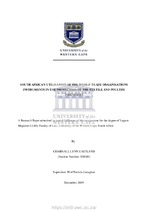South Africa’s utilisation of the world trade organisations instruments in the protection of the textile and poultry industries
Abstract
The World Trade Organisation (WTO) is the only global international organisation dealing with the rules of trade between nations.1 The WTO agreements uphold certain principles; one such principle is the rule of the most-favoured-nation (MFN) obligation. This obligation requires WTO members, who grant certain favourable treatment to any given country, to grant that same favourable treatment to all other WTO members.2 However, there are several exceptions, three of which include: actions taken against dumping (selling at an unfairly low price);
subsidies and special ‘countervailing’ duties to offset the subsidies; and emergency measures, to limit imports temporarily - thus designed to ‘safeguard’ domestic industries. These exceptions serve as remedies both against fair - and unfair trade practices. An example of remedies against fair trade practices are safeguards, and examples of remedies against unfair trade practices are dumping and countervailing duties. Anti-dumping actions are trade remedies/mechanisms available to members of the WTO in facilitating the protection of the industries under certain circumstances. The WTO agreement, which sets out the anti-dumping remedy, is the agreement on the implementation of Article VI of the General Agreement on Tariffs and Trade 1994 (GATT 1994), also known as the ‘Anti-dumping Agreement’.4 Article VI permits countries to take action against dumping and the ‘Anti-dumping Agreement’ clarifies and expands on Article VI. The two operate together. Dumping is viewed as price discrimination between the domestic and export markets and take place where the export price of a product is lower than the normal value of such product. The normal value is usually determined with reference to the domestic selling price in the exporting country. Adjustments have to be made to the normal value and export price for differences that affect prices at the time that such prices are set, including differences in terms and conditions of sale, taxations, levels of trade and quantities.

